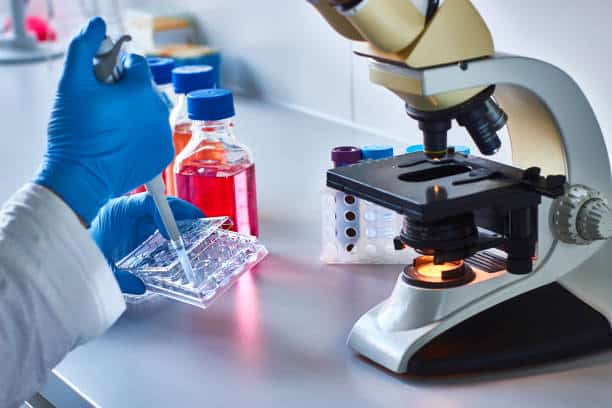Table of Contents
- What Is a Biochemistry Major?
- Sub-Division of Biochemistry
- Why Biochemistry Major?
- What does a Biochemist do?
- How to Excel in Career as a Biochemist
- What you can do with a Biochemistry Major
- You can be a High School Teacher
- You can start a Career in Toxicology
- You can Start a Career as a Medical Laboratory Technologist
- A Career in Biomedical Engineer
- A Career as a Scientific Journalist
- A Career as a Biochemist/Pharmaceutical Chemist
- A Career as a Medical Doctor
- A Career as a Forensic Expert
- A Career as a Food Scientist
- The Prospects of Biochemistry Major
- Frequently Asked Questions About Biochemistry Major
- Our Recommendation
What Is a Biochemistry Major?
Biochemistry major is a subdivision of science that deals with the systematic study of chemical processes as they relate to living organisms.
Biochemistry is a laboratory-based procedure that combines biology, which is the scientific study of living organisms, and chemistry, which is best described as the organized study of matter. In a literal sense, biochemistry is a scientific study of the chemistry of living organisms.
Through the application of chemical knowledge, skills, and procedures, biochemists decipher and proffer solutions to biological problems at the cellular and molecular stages.
Sub-Division of Biochemistry
#1. Structural Biochemistry
This is a subdivision of biochemistry that deals with the study of the chemical structures of biological macromolecules of proteins and nucleic acids (DNA and RNA).
#2. Bio-organic Chemistry
This is a subdivision that deals with the systematic study of organic compounds that see founding living things.
#3. Enzymology
This branch of biochemistry can be simply referred to as the scientific study of the behavior of biological catalysts or enzymes.
#4. Metabolic Biochemistry
This is an area of biochemistry that deals with the understanding of the different types of metabolic lanes at the cellular and organic circumstances.
#5. Xenobiotics
This is the branch of biochemistry that studies the metabolic combinations and activities of the compounds whose chemical configuration is not proper in the regular metabolism of a given living thing. They may be secondary metabolites of other organisms (eg: mycotoxins, snake venom, and phytochemicals when they enter the human body) or absent in nature or intermittent compounds.
#6. Endocrinology
This subdivision of biochemistry major deals with the scientific study of hormones that are produced by specialized cell substances whose aim is to enhance the normal and effective functioning of other cells. Endocrinology generally studies hormones, cells, and tissues
READ ALSO: Masters In Biology | MSc Programs In Biology In USA 2021.
#7. Neurochemistry
This subdivision deals with the study of organic molecules that are deeply involved in neuronal activity.
#8. Chemotaxonomy
This branch deals with the study of the categorization and classification of bodies according to their verifiable dissimilarities and similarities in their chemical composition. Those compounds can be phospholipids, proteins, peptides, glycosides, alkaloids, and terpenes.
Why Biochemistry Major?
Biochemistry major furnishes one with requisite and solid knowledge in biology and chemistry. Biochemists are schooled in some notable branches of biology which include but are not limited to genetics, molecular biology, cell biology, and biochemistry, as well as chemistry courses which can be based classified in the three branches of chemistry such as general, organic, and physical chemistry.
What does a Biochemist do?
As fundamental objectives, biochemists carry out research projects in chemistry and biology, design technical reports, manages laboratory teams, present research findings to stakeholders and scientists for an improved action that will enhance the development of the sector.
Through the usages of lasers, electron microscopes, and other classy investigative and laboratory instruments, biochemists perform extensively and carefully analysis of macromolecules and their functions in the development of an organism.
In the laboratory, the biochemists perform an analog of functions that include but are not limited to the removal of cell samples from the living organism for genetic studies and research in manufacturing effective drugs for pharmaceutical companies.
Apart from working in government and private own research institutes and establishments that are science-based, biochemists often get employed across life science sectors, such as food technology, vaccine production, pharmaceuticals, toxicology, and biotech.
How to Excel in Career as a Biochemist
A bachelor’s degree is sufficient in paving a path in the field of biochemistry for a successful career. Meanwhile, the persons with a master’s or doctorate are in a better position for gaining employment and establishing a career in high-profile and top-paying institutions and independent research firms.
Furthermore, a postdoctoral fellowship creates a better ladder for mounting to the peak of a career in biochemistry. Postdoctoral fellowships are presumed experts and distinguished fellows, thus access to fields for impacts is easier for them than those of elementary knowledge.
What you can do with a Biochemistry Major
Here are some biochemistry major jobs you can do with your degree:
You can be a High School Teacher
Those with bachelor’s degrees in biochemistry who are passionate about teaching can find solace in the opportunities available at secondary schools. A biochemist can teach basic science, biology, chemistry, agriculture, to mention but a few.
The biochemist’s knowledge of organism and their interactions can find expression through a career as a teacher in high school.
You can start a Career in Toxicology
Biochemists who are advance in the field can serve as toxicologists if specialized in the sector. Toxicologists are regarded as experts in chemicals and toxic materials who use their proficiency to investigate and appraise the safety of chemical products and drugs to ascertain their safety.
These biochemists that are specialized in toxicology can be employed by water factories, pharmaceutical industries, and chemical companies to constantly assess and ensure the safety of chemical products before consumption.
Toxicologists may also be employed by government regulatory industries like the Food and Drug Organization or the Environmental Protection Agencies.
You can Start a Career as a Medical Laboratory Technologist
As a medical lab technologist, a biochemist will work in analyzing samples of body fluids, tissues, and other biological substances in medical labs of hospitals or otherwise. Biochemist that chooses a career in Medical Laboratory specializes in analyzing the chemical contents of body fluids such as stool, mucus, tissues, blood, and urine for diagnosis of physiological subsets.
A Career in Biomedical Engineer
An experienced and trained biochemist can start a career in biomedical engineering. This field involves designing and constructing new technologies that can be utilized in hospitals and health care centers for the diagnosis of ailments and treatments.
Machines such as ventilators that are used in the hospital to aid breathing are manufactured by biomedical engineers.
A Career as a Scientific Journalist
With a biochemistry major, one can start a career as a science journalist. This class of journalists mostly deploys their knowledge of science to write for news and other educational outlets.
A Career as a Biochemist/Pharmaceutical Chemist
During your study as a biochemistry major, you can focus on researching the molecular mechanisms of biological systems. They fundamentally carry out investigations on the chemistry of the functions of cells, the molecular composition of proteins, and the interaction between chemicals and some categories of cells.
READ ALSO: Anthropology Major | Everything You Need to Know About Becoming One.
These categories of biochemists are often employed by pharmaceutical industries to develop new drugs and ascertain their bioavailability in the treatment of some ailments.
A Career as a Medical Doctor
Physicians, or medical doctors, are professionals who examine and diagnose patients and then prescribe treatments for injuries, ailments, sicknesses, and illnesses
The term “physician” refers to a wide range of medical practitioners that may include doctors who treat a specific or a wide range of conditions and illnesses. After qualification as a biochemist, one can enroll in a medical college to acquire the required knowledge to be able to function as a physician.
A Career as a Forensic Expert
Biochemist that specializes in forensic sciences assist in criminal investigations by sampling and investigating physical pieces of evidence prevalent on an object used in committing a crime. Those may include, presence of blood on an object, tissues, DNA, among other samples. Most of them work in crime labs to assist in making a finding of commission of crimes.
As a secondary function, biochemists that are forensic experts are often summoned or call into trial to testify as expert witnesses. A bachelor’s degree with coursework in forensic science and related areas of study like toxicology, pathology, or DNA can be enough to find entry-level employment in the field.
A Career as a Food Scientist
A biochemist that specializes in Food science work in the agriculture or livestock and crop production sector, studying and developing methods to improve the productivity or sustainability of crops and livestock.
Food scientists may specialize in a subfield, such as soil, plants, or livestock science. They may also function as food technologists, developing new food products, packaging techniques, or methods of detecting contaminants.
The Prospects of Biochemistry Major
Without prejudice to the surge of innovations in other sectors, the field of biochemistry is advancing beyond the ordinary and bringing innovations that are impacting the human environment and influencing and improving the harmony between humans and their environment.
Diverse researches in the field of biochemistry have birthed great development in the field of drugs production, biochemical engineering, crop, and animal production, to mention but a few.
More so, with the surge of research and scientific investigations predicated upon the rapid advancement in machine, learning, and artificial intelligence, the ability to explore other forsaken areas of biochemistry is now made possible.
The advancement in the biochemistry sector has laid to rest the issues of toxicity of drugs on their consumers. Aside from curative drugs, preventive drugs such as vaccines are also being developed on daily basis.
Bearing in mind its role in the world of life science as a means of solving a plethora of health, industrial, and science-related predicaments, employment opportunities, and prospects in the area are expected to go up exponentially within the next decade.
Frequently Asked Questions About Biochemistry Major
Is a biochemistry major worth it?
Yes! A biochemistry major is certainly worth it b bearing in mind its role in the world of life science as a means of solving a plethora of health, industrial, and science-related predicaments, and its employment opportunities
Can a biochemistry major become a doctor?
Yes, a biochemistry major can become a medical doctor. After qualification as a biochemist, one can enroll in a medical college to acquire the required knowledge to be able to function as a medical doctor.
What is the average GPA for a biochemistry major?
The average GPA in the Biochemistry major is 3.16
What is the major subject in biochemistry?
Biochemistry combines the studies of biology, chemistry, and physics to research how science affects living organisms.
Is biochemistry major hard?
Biochemistry major is considered one of the hardest majors in college as organic chemistry (a branch of biochemistry) takes the No. 1 spot as the hardest
Do Biochemists make good money?
Biochemists made a median salary of $94,490 in 2019. The best-paid 25 percent made $132,200 that year, while the lowest-paid 25 percent made $66,550.
Our Recommendation
- How to Become a Laser Technician | What They Do, Salary, Certification, Required Skills & More.
- How To Become A Patient Care Assistant | Jobs, Salary, Certification, Required Skills And More.
- How to Become a Dermatologist in California, 2021.
- Top 9 Masters In Bioinformatics Online 2021 | Online Schools, Tuition & Salaries
- Optometric Assistant | What They Do, Salary, Certification, Required Skills & More.
- Pharmacology Degree | How to Become a pharmacologist.
- How Much Does A Pharmacist Make In The United States?
- 10 Things To Consider Before Choosing A Career Path.
- Easy Way To Enrol In Online Pharmacy Courses | Educational Requirements, Duration and Schools.
- Anthropology Major | Everything You Need to Know About Becoming One.






